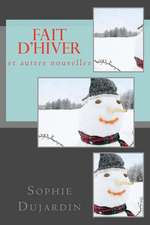The View from the Seventh Layer
Autor Kevin Brockmeieren Limba Engleză Paperback – 28 feb 2009
Preț: 110.28 lei
Nou
Puncte Express: 165
Preț estimativ în valută:
21.10€ • 22.09$ • 17.46£
21.10€ • 22.09$ • 17.46£
Carte disponibilă
Livrare economică 15-29 martie
Preluare comenzi: 021 569.72.76
Specificații
ISBN-13: 9780307387769
ISBN-10: 0307387763
Pagini: 267
Dimensiuni: 134 x 203 x 16 mm
Greutate: 0.2 kg
Editura: Vintage Books USA
ISBN-10: 0307387763
Pagini: 267
Dimensiuni: 134 x 203 x 16 mm
Greutate: 0.2 kg
Editura: Vintage Books USA
Notă biografică
Kevin Brockmeier is the author of The Brief History of the Dead, The Truth About Celia, Things That Fall from the Sky, and two children's novels. He has taught at the Iowa Writers' Workshop. His stories have appeared in many publications, including The New Yorker, McSweeney's, and Oxford American, and have been anthologized in The Best American Short Stories, The O. Henry Prize Stories, and Granta's Best of Young American Novelists. He lives in Little Rock, Arkansas.
Extras
A Fable Ending in the Sound of a Thousand Parakeets
Once there was a city where everyone had the gift of song. Gardeners sang as they clipped their flowers. Husbands and wives sang each other to sleep at night. Groups of children waiting for the school bell to ring raced through the verses of the latest pop songs to get to the pure spun sugar of the choruses. Old friends who had not seen one another in many years met at wakes and retirement parties to sing the melodies they remembered from the days when they believed there was nothing else in the world that would ever grip their spirits so and take them out of their bodies. Life was carried along on a thousand little currents of music, and it was not unusual to hear a tune drifting out from behind the closed door of an office as you passed, or even from the small back room of the art museum, which was almost but never quite empty. The people of the city did not always sing with great skill, but they sang clearly and with a simplicity of feeling that made their voices beautiful to hear. And because they loved what they sang, no matter how painful or melancholy, a note of indomitable happiness ran through their voices like a fine silver thread.
In this city there lived a mute, the only person who was unable to lend his voice to the great chorus of song that filled the air. The mute had spent his entire life in the city, and everyone from the members of the school board to the stock boys at the grocery store knew who he was. In some communities there is a man who sells whistles by the courthouse or paper kites down by the river. In others there is a woman who decorates her home with multicolored lights and streamers every holiday. Usually these people are no more than small figures at the periphery of everyone’s attention, but when they die, it can be more surprising than the death of a prominent leader or a renowned artist, because no one has ever regarded them carefully enough to consider what their absence might mean.
The mute was of that age where his hair had turned white and his shoes no longer seemed to fit him properly. Some of his neighbors believed he was deaf—an understandable mistake. He was not deaf, though, only mute, and from time to time he liked to sit in a chair on his front porch and listen to the people around him chatting with one another as they took their afternoon walks. They would say things like “I’m telling you, buddy, the second my pension kicks in, it’s off to the tropics for me.” And “Peter asked me out for dinner tonight, dear thing. I think he’s finally going to pop the question.” And “That’s the deaf man, Sarah. He can’t hear you, but that’s no reason you can’t be friends with him. Why don’t you go wave hello?” It comforted him to listen to these conversations. He had never married or fathered children, and behind the door of his house, there was only the quiet tapping of his footsteps and the endless chirping and fluttering of the parakeets.
The mute had gotten his first pair of birds when he was still a young man, purchasing them from a pet vendor he met in the city park. One morning he had seen them preening and tilting their heads in the sunlight, and that was all it took. The color of their feathers seemed to call out to him: the jewel-like greens and yellows of their wings, the shaded blue around their necks, but most of all the lovely soft purple above their beaks. It was not until he released the parakeets into his living room and watched them hop from the back of the chair onto the curtain rod, and from the curtain rod onto the shelf beside the mirror, that he felt something slipping loose inside him and realized how much he had needed their companionship.
One of the parakeets turned out to be a male, and the other a female, and soon he had five birds to take care of. The next year he bought two more from the pet vendor and watched another three hatch from their eggs. It wasn’t long before he had so many birds that he knew he had to do something. He hauled the good furniture out of the parlor and attached dozens of little swings, perches, ladders, and mirrors to the walls. He put a wooden gate in the doorway. He even installed a pair of recessed skylights in the ceiling so that the birds could watch the shadows of the clouds move across the floor. In the end he believed he had managed to create the kind of space a parakeet might enjoy.
He loved each and every one of his birds, and over the years, as the flock grew in size, he learned various tricks to distinguish them from one another. It was only from a distance, he realized, that their bodies seemed to blur together into a single shifting net of brightly colored wings and tails. When you looked more carefully, you noticed that one of the birds had a particular way of tucking her head under her wing while she ate. Another liked to stand by the window after the sun went down, pecking at her reflection in the glass. Another wore a set of markings on his back that looked like two-day-old snow, with dapples of wet grass beginning to show through. Every bird was unique.
He enjoyed watching their lives play out inside the walls of his house, and he took tremendous satisfaction in being able to feed and take care of them. It felt good to be needed by something with a working voice and a beating heart. He often wondered if the other people in the city knew how much happiness a creature so small could bring.
When did he first start giving the birds away as presents? No one could remember, least of all the mute. But a time came when he might be expected to turn up at any public celebration with a bamboo cage in his hands and a bag of fresh seed in his pocket, smiling and nodding in that richly communicative way of his. He became a fixture at birthday parties, baptisms, inaugurations, and weddings. There was always singing on such occasions, of course, a boundless wave of pop songs and old standards. As he listened to all the love and sorrow wrapped up inside the harmonies, he wished more than anything that he could join in, but the only thing he had to offer was his parakeets.
With every bird he gave away, he included a set of instructions that ended with the sentence “Parakeets are natural mimics, and if you treat your bird as you would a human being, it is likely that he or she will learn how to talk.” Some of the people who accepted the birds from him were busy or practical-minded sorts who had little interest in keeping a pet, but were too polite to tell him so. They stowed the parakeets away in a dimly lit corner of their spare bedroom, or even set them loose in the woods at the edge of town. Others appreciated the birds as no more than a spectacle or a diversion, something to feed every morning and take out whenever they happened to grow bored. Only a few cherished them as much as the mute did. Still, most of the people who kept the birds were able to teach them such simple phrases as “Good morning,” “What’s your name?,” and “I love you.” A number of the birds were clever enough to learn a more complicated set of expressions: “It’s a cruel, cruel world,” for instance, and “How about this weather we’re having?” One man successfully showed his parakeet how to say “I prefer the music of Brahms” whenever anyone turned on the radio. Another taught his bird to say “Hubba-hubba” every time a redheaded woman came into the room.
There was one particular bird who was able to reproduce almost any sound he heard, but when his owner coached him to repeat the phrase “I don’t understand the words they’re making me say,” he refused to utter so much as a syllable.
For every parakeet the mute gave away, two more were born into his parlor. Some of the birds died of illness or old age, but there were always new birds to replace them, and the flock showed no sign of diminishing. It began to seem to the mute that the rules of time had been suspended inside the aviary—or if not suspended, then at least reshaped. When he brought his first pair of birds home from the city park, they had not been much older than children, he now realized—and neither, for that matter, had he. Then something changed, and he began to settle into the rhythm of his days and nights. His grandparents died, and later his parents. The long history of a lifetime fell into place behind him. And the birds, it seemed to him, were still not much older than children.
Sometimes he stood at the gate watching them flit about between their perches and allowed his mind to wander. He couldn’t help thinking of his childhood, particularly those times when he would sit at the back of his classroom during choir practice. He remembered what it was like to listen to everybody singing, to feel the music scaling and building inside him, higher and higher, climbing toward the open air, until it became so powerful that he was almost sure it would not give way this time, though invariably it did. He used to shut his eyes and sway back and forth behind his desk. Anyone could see what was happening to him. The truth was that he, too, had the gift of song—it was just that he could not make use of it. One of his teachers had the idea of giving him a tambourine to shake, and that helped for a while, but the rattling sound it made was not quite what he was looking for. Later he thought about learning to play a real instrument—a flute, maybe, or a clarinet—but as it turned out, he did not have the talent for it.
The mute gazed at the birds until his memory faded away. Then he went to the front porch to wait for his neighbors to take their afternoon walks.
No one who has ever lived closely with a flock of birds and come to know their eccentricities could say that they are not intelligent. The parakeets were curious about this man who never spoke, who filled their seed dishes every morning and fed them sweet corn, grapes, and chopped carrots in the evening. Sometimes he stood behind the bars of their cage with a faraway look in his eyes and made a sound like the wind puffing through a long concrete pipe. Sometimes he fluttered his fingers at them, making a friendly chook-chook-chook noise with the tip of his tongue. What did these activities mean?
The birds studied the mute as though he were a puzzle. And because they had always understood the world best by participating in it, after a while they began to imitate him. They mimicked the clang that went echoing down the hall when he dropped a pot in the kitchen. They jingled like a pair of silver bells when his alarm clock went off in the morning. They duplicated the sound of his footsteps tapping across the wooden floor, the sigh that came from his chair when he sank into the upholstery, and even the small back-and-forth sawing noise of his breathing as he drifted off to sleep.
From the Hardcover edition.
Once there was a city where everyone had the gift of song. Gardeners sang as they clipped their flowers. Husbands and wives sang each other to sleep at night. Groups of children waiting for the school bell to ring raced through the verses of the latest pop songs to get to the pure spun sugar of the choruses. Old friends who had not seen one another in many years met at wakes and retirement parties to sing the melodies they remembered from the days when they believed there was nothing else in the world that would ever grip their spirits so and take them out of their bodies. Life was carried along on a thousand little currents of music, and it was not unusual to hear a tune drifting out from behind the closed door of an office as you passed, or even from the small back room of the art museum, which was almost but never quite empty. The people of the city did not always sing with great skill, but they sang clearly and with a simplicity of feeling that made their voices beautiful to hear. And because they loved what they sang, no matter how painful or melancholy, a note of indomitable happiness ran through their voices like a fine silver thread.
In this city there lived a mute, the only person who was unable to lend his voice to the great chorus of song that filled the air. The mute had spent his entire life in the city, and everyone from the members of the school board to the stock boys at the grocery store knew who he was. In some communities there is a man who sells whistles by the courthouse or paper kites down by the river. In others there is a woman who decorates her home with multicolored lights and streamers every holiday. Usually these people are no more than small figures at the periphery of everyone’s attention, but when they die, it can be more surprising than the death of a prominent leader or a renowned artist, because no one has ever regarded them carefully enough to consider what their absence might mean.
The mute was of that age where his hair had turned white and his shoes no longer seemed to fit him properly. Some of his neighbors believed he was deaf—an understandable mistake. He was not deaf, though, only mute, and from time to time he liked to sit in a chair on his front porch and listen to the people around him chatting with one another as they took their afternoon walks. They would say things like “I’m telling you, buddy, the second my pension kicks in, it’s off to the tropics for me.” And “Peter asked me out for dinner tonight, dear thing. I think he’s finally going to pop the question.” And “That’s the deaf man, Sarah. He can’t hear you, but that’s no reason you can’t be friends with him. Why don’t you go wave hello?” It comforted him to listen to these conversations. He had never married or fathered children, and behind the door of his house, there was only the quiet tapping of his footsteps and the endless chirping and fluttering of the parakeets.
The mute had gotten his first pair of birds when he was still a young man, purchasing them from a pet vendor he met in the city park. One morning he had seen them preening and tilting their heads in the sunlight, and that was all it took. The color of their feathers seemed to call out to him: the jewel-like greens and yellows of their wings, the shaded blue around their necks, but most of all the lovely soft purple above their beaks. It was not until he released the parakeets into his living room and watched them hop from the back of the chair onto the curtain rod, and from the curtain rod onto the shelf beside the mirror, that he felt something slipping loose inside him and realized how much he had needed their companionship.
One of the parakeets turned out to be a male, and the other a female, and soon he had five birds to take care of. The next year he bought two more from the pet vendor and watched another three hatch from their eggs. It wasn’t long before he had so many birds that he knew he had to do something. He hauled the good furniture out of the parlor and attached dozens of little swings, perches, ladders, and mirrors to the walls. He put a wooden gate in the doorway. He even installed a pair of recessed skylights in the ceiling so that the birds could watch the shadows of the clouds move across the floor. In the end he believed he had managed to create the kind of space a parakeet might enjoy.
He loved each and every one of his birds, and over the years, as the flock grew in size, he learned various tricks to distinguish them from one another. It was only from a distance, he realized, that their bodies seemed to blur together into a single shifting net of brightly colored wings and tails. When you looked more carefully, you noticed that one of the birds had a particular way of tucking her head under her wing while she ate. Another liked to stand by the window after the sun went down, pecking at her reflection in the glass. Another wore a set of markings on his back that looked like two-day-old snow, with dapples of wet grass beginning to show through. Every bird was unique.
He enjoyed watching their lives play out inside the walls of his house, and he took tremendous satisfaction in being able to feed and take care of them. It felt good to be needed by something with a working voice and a beating heart. He often wondered if the other people in the city knew how much happiness a creature so small could bring.
When did he first start giving the birds away as presents? No one could remember, least of all the mute. But a time came when he might be expected to turn up at any public celebration with a bamboo cage in his hands and a bag of fresh seed in his pocket, smiling and nodding in that richly communicative way of his. He became a fixture at birthday parties, baptisms, inaugurations, and weddings. There was always singing on such occasions, of course, a boundless wave of pop songs and old standards. As he listened to all the love and sorrow wrapped up inside the harmonies, he wished more than anything that he could join in, but the only thing he had to offer was his parakeets.
With every bird he gave away, he included a set of instructions that ended with the sentence “Parakeets are natural mimics, and if you treat your bird as you would a human being, it is likely that he or she will learn how to talk.” Some of the people who accepted the birds from him were busy or practical-minded sorts who had little interest in keeping a pet, but were too polite to tell him so. They stowed the parakeets away in a dimly lit corner of their spare bedroom, or even set them loose in the woods at the edge of town. Others appreciated the birds as no more than a spectacle or a diversion, something to feed every morning and take out whenever they happened to grow bored. Only a few cherished them as much as the mute did. Still, most of the people who kept the birds were able to teach them such simple phrases as “Good morning,” “What’s your name?,” and “I love you.” A number of the birds were clever enough to learn a more complicated set of expressions: “It’s a cruel, cruel world,” for instance, and “How about this weather we’re having?” One man successfully showed his parakeet how to say “I prefer the music of Brahms” whenever anyone turned on the radio. Another taught his bird to say “Hubba-hubba” every time a redheaded woman came into the room.
There was one particular bird who was able to reproduce almost any sound he heard, but when his owner coached him to repeat the phrase “I don’t understand the words they’re making me say,” he refused to utter so much as a syllable.
For every parakeet the mute gave away, two more were born into his parlor. Some of the birds died of illness or old age, but there were always new birds to replace them, and the flock showed no sign of diminishing. It began to seem to the mute that the rules of time had been suspended inside the aviary—or if not suspended, then at least reshaped. When he brought his first pair of birds home from the city park, they had not been much older than children, he now realized—and neither, for that matter, had he. Then something changed, and he began to settle into the rhythm of his days and nights. His grandparents died, and later his parents. The long history of a lifetime fell into place behind him. And the birds, it seemed to him, were still not much older than children.
Sometimes he stood at the gate watching them flit about between their perches and allowed his mind to wander. He couldn’t help thinking of his childhood, particularly those times when he would sit at the back of his classroom during choir practice. He remembered what it was like to listen to everybody singing, to feel the music scaling and building inside him, higher and higher, climbing toward the open air, until it became so powerful that he was almost sure it would not give way this time, though invariably it did. He used to shut his eyes and sway back and forth behind his desk. Anyone could see what was happening to him. The truth was that he, too, had the gift of song—it was just that he could not make use of it. One of his teachers had the idea of giving him a tambourine to shake, and that helped for a while, but the rattling sound it made was not quite what he was looking for. Later he thought about learning to play a real instrument—a flute, maybe, or a clarinet—but as it turned out, he did not have the talent for it.
The mute gazed at the birds until his memory faded away. Then he went to the front porch to wait for his neighbors to take their afternoon walks.
No one who has ever lived closely with a flock of birds and come to know their eccentricities could say that they are not intelligent. The parakeets were curious about this man who never spoke, who filled their seed dishes every morning and fed them sweet corn, grapes, and chopped carrots in the evening. Sometimes he stood behind the bars of their cage with a faraway look in his eyes and made a sound like the wind puffing through a long concrete pipe. Sometimes he fluttered his fingers at them, making a friendly chook-chook-chook noise with the tip of his tongue. What did these activities mean?
The birds studied the mute as though he were a puzzle. And because they had always understood the world best by participating in it, after a while they began to imitate him. They mimicked the clang that went echoing down the hall when he dropped a pot in the kitchen. They jingled like a pair of silver bells when his alarm clock went off in the morning. They duplicated the sound of his footsteps tapping across the wooden floor, the sigh that came from his chair when he sank into the upholstery, and even the small back-and-forth sawing noise of his breathing as he drifted off to sleep.
From the Hardcover edition.
Recenzii
“Some writers show us the world we live in. Brockmeier shows us, instead, the one we might live in if only we had a little more imagination.”
—Los Angles Times
"Powerfully affecting. . . . Carefully observed. . . . A field of sparks set ablaze by Brockmeier's artistic hand.”
—The Miami Herald
“[Filled] with lyrical grace, indelible characters and deep insight. . . . Startlingly original.”
—Tucson Citizen
“Devilishly addictive. . . . Brockmeier slakes our thirst once again with rich language, measured telling, [and] a hint of wonder.”
—The Seattle Times
—Los Angles Times
"Powerfully affecting. . . . Carefully observed. . . . A field of sparks set ablaze by Brockmeier's artistic hand.”
—The Miami Herald
“[Filled] with lyrical grace, indelible characters and deep insight. . . . Startlingly original.”
—Tucson Citizen
“Devilishly addictive. . . . Brockmeier slakes our thirst once again with rich language, measured telling, [and] a hint of wonder.”
—The Seattle Times




















